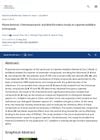 April 2023 in “Acta Poloniae Pharmaceutica”
April 2023 in “Acta Poloniae Pharmaceutica” Herbal extract shampoo increased certain minerals in hair and improved hair growth and scalp health.
 9 citations,
December 2022 in “Phytomedicine”
9 citations,
December 2022 in “Phytomedicine” More high-quality research is needed to recommend flavonoids and saponins for clinical use.
2 citations,
January 2024 in “Pharmaceuticals” Deep eutectic solvents are eco-friendly and effective for extracting useful pharmaceutical compounds.
 4 citations,
March 2020 in “Journal of Cosmetic Dermatology”
4 citations,
March 2020 in “Journal of Cosmetic Dermatology” Plumbago zeylanica extract helps hair growth and reduces a hair loss-related enzyme.
 March 2024 in “Tropical Journal of Natural Product Research”
March 2024 in “Tropical Journal of Natural Product Research” Many people in Fez-Meknes use potentially toxic plants for various health and cosmetic purposes, but more research is needed to ensure their safety.
 57 citations,
October 2021 in “Journal of ethnopharmacology”
57 citations,
October 2021 in “Journal of ethnopharmacology” Indian herbal medicine shows promise for treating skin diseases but needs more research to prove effectiveness.
 July 2024 in “Science and Culture”
July 2024 in “Science and Culture” Thuja orientalis L. has many health benefits and could be used in new medicines.
 15 citations,
October 2021 in “Frontiers in Pharmacology”
15 citations,
October 2021 in “Frontiers in Pharmacology” Natural volatiles and essential oils have health benefits and can enhance the effects of some medicines, but more research is needed to understand how they work and their possible side effects.
 69 citations,
July 1997 in “Der Urologe”
69 citations,
July 1997 in “Der Urologe” Sabal and Urtica extract works as well as finasteride for treating BPH, with fewer side effects.
 8 citations,
May 2017 in “Current traditional medicine”
8 citations,
May 2017 in “Current traditional medicine” Stinging nettle has compounds that help with joint pain, arthritis, and prostate issues.
 3 citations,
January 2019 in “Therapeutic advances in urology”
3 citations,
January 2019 in “Therapeutic advances in urology” WS PRO 160 I 120 mg effectively treats urinary symptoms from BPH with good safety and tolerability.
 2 citations,
December 2021 in “ScienceRise”
2 citations,
December 2021 in “ScienceRise” The best way to extract oil from Urtica dioica roots is by using corn oil, a 1:5 ratio of raw material to extract, extracting for 6 hours, and using the maceration method.
1 citations,
January 2023 in “PubMed” Urtica dioica extract may help treat androgenic skin diseases by reducing a specific gene's activity.
 December 2023 in “Natural product research”
December 2023 in “Natural product research” Lignans from Urtica triangularis may help treat benign prostatic hyperplasia (BPH).
 March 2023 in “International Journal of Advanced Research in Science, Communication and Technology”
March 2023 in “International Journal of Advanced Research in Science, Communication and Technology” Various medicinal plants like Polygonum multiflorum, Red ginseng extract, and Zizyphus jujuba can potentially treat hair loss, offering benefits like low cost and multiple ways of working. Other effective natural substances include Pygeum africanum, Seneroa, Urtica dioica, and more.
 67 citations,
February 2015 in “Life Sciences”
67 citations,
February 2015 in “Life Sciences” Some plant-based treatments can help with benign prostatic hyperplasia symptoms, but more research is needed to confirm their safety and effectiveness.
54 citations,
September 2002 in “Annals of Pharmacotherapy” Herbal treatments can help with early-stage BPH symptoms, but more research is needed.
 33 citations,
May 2013 in “Andrologia”
33 citations,
May 2013 in “Andrologia” Some herbs show promise as antiandrogenic agents.
February 2024 in “Cosmetics” The conclusion is that new plant-based treatments for hair loss may work by targeting certain enzymes.
 January 2022 in “Acta botanica Caucasica”
January 2022 in “Acta botanica Caucasica” Turkish herbal cosmetics use various plants for hair care, skincare, and other personal hygiene purposes.
 January 2009 in “Elsevier eBooks”
January 2009 in “Elsevier eBooks” Some plant-based treatments may help with ovary function, insulin resistance, and excess male hormones in PCOS, but more research is needed to confirm their safety and effectiveness.
February 2023 in “Current Pharmaceutical Design” Natural remedies like certain plants can help reduce hair loss and promote hair growth.
 6 citations,
May 2022 in “Chemistry & biodiversity”
6 citations,
May 2022 in “Chemistry & biodiversity” *Laportea bulbifera* contains unique compounds that may help treat benign prostatic hyperplasia.
 4 citations,
February 2021 in “Journal of Cosmetic Dermatology”
4 citations,
February 2021 in “Journal of Cosmetic Dermatology” Pumpkin seed oil slightly outperforms minoxidil foam in treating hair loss with fewer side effects.
 98 citations,
August 2004 in “BJU international”
98 citations,
August 2004 in “BJU international” Medications have become the main treatment for enlarged prostate symptoms, replacing surgery and watchful waiting.
 81 citations,
June 2010 in “Journal of Dermatological Treatment”
81 citations,
June 2010 in “Journal of Dermatological Treatment” The document concludes that minoxidil and finasteride are proven for hair growth, herbal remedies show promise, but more research is needed to confirm their effectiveness.
 49 citations,
July 2021 in “Nutrients”
49 citations,
July 2021 in “Nutrients” Eating healthy, exercising, and taking certain supplements can help manage Polycystic Ovary Syndrome symptoms.
 41 citations,
July 2015 in “Current Drug Discovery Technologies”
41 citations,
July 2015 in “Current Drug Discovery Technologies” Some plants may help with hair growth and have fewer side effects than synthetic drugs, but more research is needed to confirm their effectiveness.
 39 citations,
September 2013 in “Journal of Cosmetic Dermatology”
39 citations,
September 2013 in “Journal of Cosmetic Dermatology” Herbs can potentially treat hair loss by inhibiting a key enzyme and promoting hair growth, and deficiencies in zinc, biotin, and iron are linked to hair loss.
 39 citations,
June 2013 in “Journal of Cosmetic Dermatology”
39 citations,
June 2013 in “Journal of Cosmetic Dermatology” Herbal extracts and platelet-rich plasma together may help increase hair growth by making certain cells grow more, through specific cell growth pathways.
























